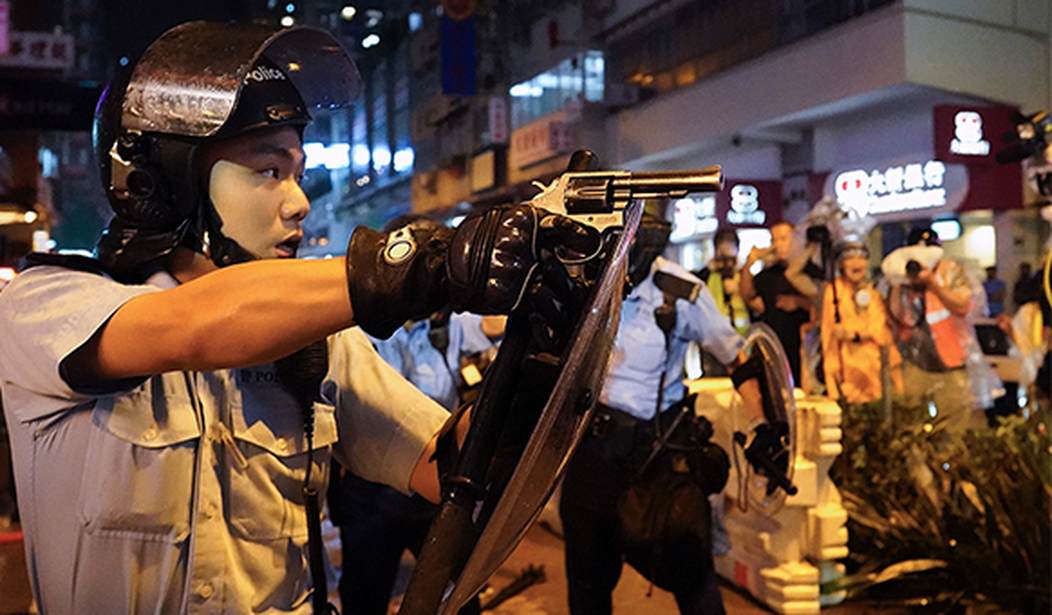On June 30, 2020, the Chinese Communist Party (CCP) imposed … well, a bunch of communist legislation against the people of Hong Kong. Known colloquially as the “national security law,” this legislation went into effect immediately and has severely curtailed the fundamental rights of Hong Kongers over the last 12 months.
The national security law is composed of 66 total articles, which vaguely define various offenses, such as “subversion” (undermining the power or authority of the central government) and “terrorism” (using violence or intimidation against people). It was also drafted entirely in secret, and even Hong Kong Chief Executive Carrie Lam was shut out of Beijing’s legislative process.
Hong Kong, which was a British colony until 1997, is a special administrative region of China under the latter’s “one country, two systems” doctrine. But the line between the “two systems” — capitalist autonomy and communist heteronomy — has increasingly blurred in recent years.
In the spring of 2019, mass protests broke out against Hong Kong’s extradition bill, a CCP scheme to extradite criminal suspects from Hong Kong to Beijing for trial. The unrest forced Hong Kong International Airport to shut its doors for several days, and images of protesters waving American flags in their fight for freedom garnered global support for their cause.
On Oct. 23, 2019, Hong Kong formally scrapped the extradition bill — a big win for freedom. But the Wuhan coronavirus pandemic has since given the CCP a new excuse to clamp down on dissent in Hong Kong. Earlier this month, for example, demonstrations commemorating the 1989 Tiananmen Square massacre were banned by officials who cited public health concerns.
Recommended
Since the enactment of the national security law, at least 128 people have been arrested for national security violations. Among them were several staff members of Apple Daily, a pro-democracy newspaper forced to cease all operations last week.
Also last week, the first trial of those 128 detainees began without a jury present. Tong Ying-kit, 24, was accused of ramming his motorcycle into police lines during a protest against the national security law. If convicted, he faces a life sentence.
Several politicians in the United States have noted the one-year anniversary of the national security law while confirming their support for Hong Kong’s citizens in their struggle against CCP overreach:
China promised the world it would respect Hong Kong’s democratic traditions for 50 years.
— Kevin McCarthy (@GOPLeader) June 24, 2021
This week, Apple Daily, Hong Kong’s leading pro-democracy newspaper, was shuttered due to Communist oppression.
China cannot be trusted—period. pic.twitter.com/dspqC4MVQ9
THREAD ?? Next week marks the 100th anniversary of the founding of the Chinese Communist Party. Far from a cause for celebration, it's an important opportunity the remember the millions murdered by the Party and recommit ourselves to the inalienable freedom of the Chinese people. https://t.co/POnUbuUbL1
— Rep. Mike Gallagher (@RepGallagher) June 25, 2021
Under Hong Kong’s National Security Law—the law that effectively gives Beijing total control over the former democracy—over 10,000 Hong Kongers have been arrested. Some for even simply protesting the government takeover.
— Jim Banks (@RepJimBanks) June 3, 2021
A glimpse of the world if #CCP overtakes USA.
Tom, @RepKinzinger and @RepGregoryMeeks are standing with the people of Hong Kong on the one year anniversary of the Beijing-imposed crackdown. Today they introduced a bill to protect Hong Kongers & send the message that their freedoms are not negotiable.https://t.co/sOdwk6M8w1
— Rep. Tom Malinowski (@RepMalinowski) June 30, 2021
























Join the conversation as a VIP Member